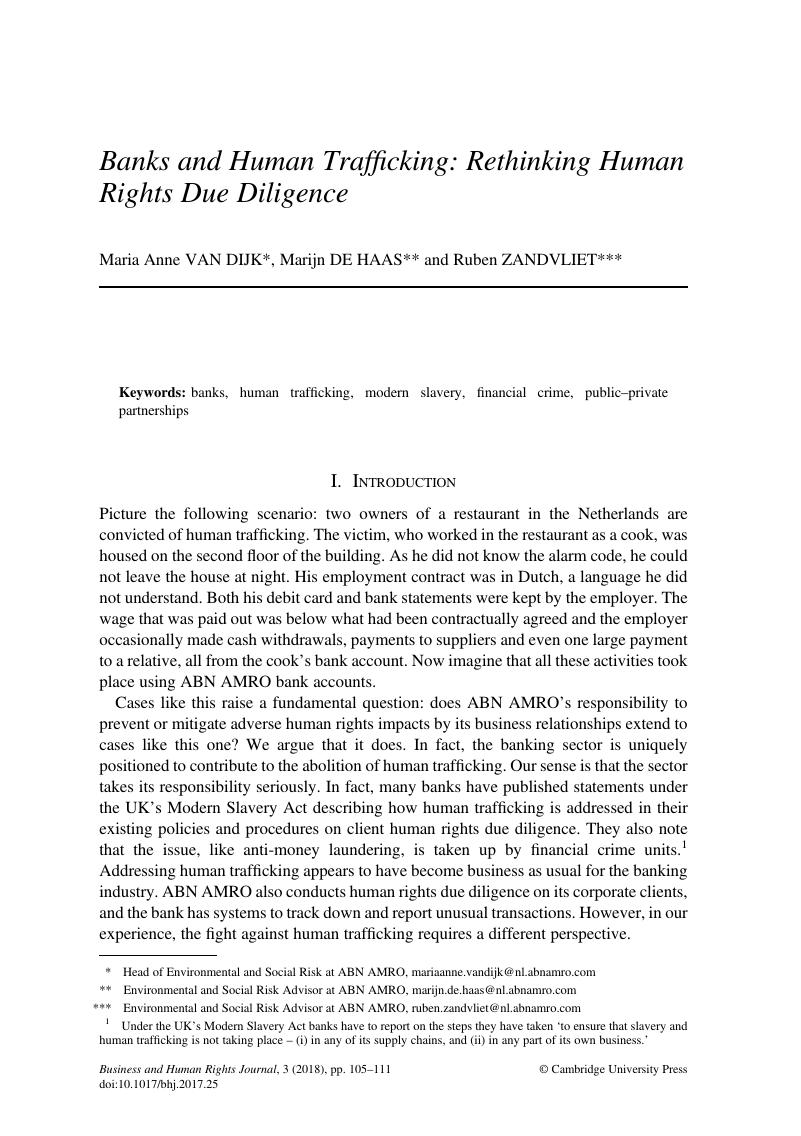Published online by Cambridge University Press: 06 November 2017

Head of Environmental and Social Risk at ABN AMRO, [email protected]
Environmental and Social Risk Advisor at ABN AMRO, [email protected]
Environmental and Social Risk Advisor at ABN AMRO, [email protected]
1 Under the UK’s Modern Slavery Act banks have to report on the steps they have taken ‘to ensure that slavery and human trafficking is not taking place – (i) in any of its supply chains, and (ii) in any part of its own business.’
2 See ABN AMRO Human Rights Report 2016, pp. 12–18 on privacy and non-discriminatory access to finance in relation to our retail operations, and pp. 19–22 on labour rights and workplace discrimination concerns in relation to our role as an employer.
3 Ruggie notes that: ‘There is a continuum between contribution and linkage. A variety of factors can determine where on that continuum a particular instance may sit. They include the extent to which a business enabled, encouraged, or motivated human rights harm by another; the extent to which it could or should have known about such harm; and the quality of any mitigating steps it has taken to address it.’ John G Ruggie, ‘Comments on Thun Group of Banks Discussion Paper on the Implications of UN Guiding Principles 13 & 17 in a Corporate and Investment Banking Context’, 21 February 2017, at 2.
4 UNGP 15, Human Rights Council, ‘Guiding Principles on Business and Human Rights: Implementing the United Nations’ “Protect, Respect and Remedy” Framework’, A/HRC/17/31 (21 March 2011). The nature of the due diligence varies between the degrees of involvement, however.
5 This includes everything from Sustainalytics, RepRisk, internet search strings, NGO reports, Business and Human Rights Resource Centre.
6 Dutch Banking Sector Agreement on international responsible business conduct regarding human rights (October 2016).
7 Netherlands Institute for Human Rights, ‘Portugese en Poolse A2-bouwers hebben recht op cao arbeidsvoorwaarden’ (31 August 2015).
8 Although our contribution does not aim to provide a conceptual reflection on the UNGPs, the ability to take certain actions certainly affects one’s responsibility; see UNGP 19(b)(ii).
9 The Dakota Access Pipeline is arguably the most prominent example in which a number of banks decided to end their relationship with companies involved, or backed out of the project finance. Leverage is also discussed in the context of the Dutch Banking Sector Agreement on human rights. A final paper is expected this autumn.
10 It should be noted that cases that occur in the Netherlands also have an international context due to the transboundary element in human trafficking cases.
11 The Thun Group of Banks, ‘Discussion Paper on the Implications of UN Guiding Principles 13 & 17 in a Corporate Banking and Investment Banking Context’ (January 2017) at 10.
12 The Thun Group of Banks, ‘UN Guiding Principles on Business and Human Rights: Discussion Paper for Banks on Implications of Principles 16–21’ (October 2013) at 12–13 is a rare example.
13 Tom Keatinge and Anne-Marie Barry, ‘Disrupting Human Trafficking: The Role of Financial Institutions’ (RUSI Whitehall Report 1–17, March 2017) at vii.
14 In December 2016, the United Nations (UN) Security Council adopted its first-ever resolution on human trafficking. It asks member states to consider reinforcing its legislative framework to facilitate data sharing between law enforcement authorities and the private sector ‘to help identify and detect suspicious financial activity related to trafficking in persons that finances terrorism’. UN Security Council Resolution 2331 (2016), emphasis added.
15 The Bankers’ Alliance Against Trafficking, ‘Human Trafficking: Customer and Financial Transaction Traits That May Present Risk’ (17 February 2014).
16 HSBC, Modern Slavery and Human Trafficking Statement 2016, 21 February 2017.
17 OHCHR, ‘Human Rights and Human Trafficking’, Fact Sheet No. 36 (2014) at 7.
18 UK Government, Transparency in Supply Chains etc – A Practical Guide, at 5.